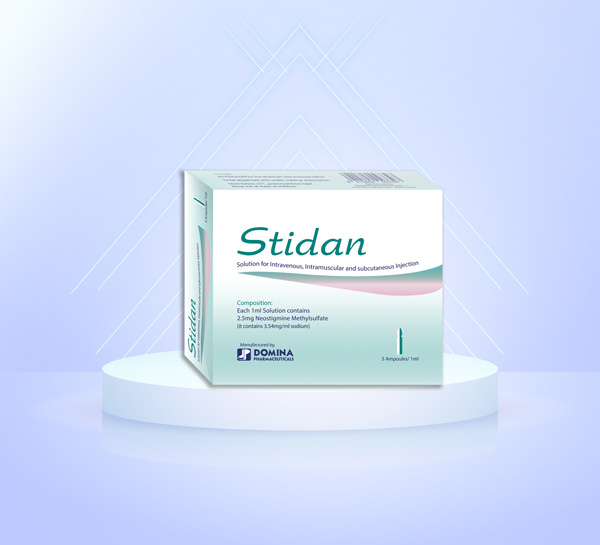
Composition:
Each 1ml solution contains 2.5mg Neostigmine Methylsulfat.
Mechanism of action:
Neostigmine inhibits cholinesterase activity and prolongs and intensifies the muscarinic and nicotinic effects of acetylcholine.
The anti-cholinesterase actions of Neostigmine are reversible. It is used mainly for its action on skeletal muscle
and less frequently to increase the activity of smooth muscle.
Indications:
- Myasthenia Gravis.
- Antagonist to non-depolarizing neuromuscular blockade.
- Paralytic Ileus.
- Post-operative Urinary Retention.
- Paroxysmal Supraventricular Tachycardia.
Contraindications:
1- Hypersensitivity to neostigmine or to any of the excipients.
2- Patients with mechanical obstruction of gastrointestinal or urinary tracts, peritonitis or doubtful bowel viability.
3-Neostigmine should not be used in conjunction with depolarising muscle relaxants such as suxamethonium as
neuromuscular blockade may be potentiated.
warnings and precautions:
- Stidan should be used with extreme caution in patients with asthma as the parasympathomimetic action of neostigmine may
- cause bronchoconstriction.
- Bradycardia, with the potential for progression to asystole, may occur in patients receiving by intravenous injection unless atropine is given simultaneously. Extreme caution should be employed when treating patients with preexisting bradycardia, cardiac arrhythmia or recent coronary occlusion.
- Patients who are hyperreactive to neostigmine experience a severe cholinergic reaction to the drug. Atropine sulfate should always be available as an antagonist for the muscarinic effects of neostigmine.
- Neostigmine should be used with caution in patients with epilepsy, vagotonia, hyperthyroidism, peptic ulceration or parkinsonism.
- Administration of anticholinesterase agents to patients with intestinal anastomoses may produce rupture of the anastomosis or leakage of intestinal contents.
- Stidan should not be given during cyclopropane or halothane anaesthesia; although it may be used after withdrawal of these agents.
Side effects:
Adverse effects of Neostigmine are chiefly those of exaggerated response to parasympathetic stimulation: hypersensitivity, angioedema, anaphylactic reaction, cholinergic syndrome, lacrimation increased, bradycardia, decreased cardiac conduction, hypotension, increased bronchial secretion, nausea, vomiting, diarrhea, abdominal cramps,
salivary hypersecretion. hyperhidrosis, muscle spasms and urinary incontinence.
Drug Interactions:
- Neostigmine effectively antagonises the effect of Non-depolarizing muscle relaxants (e.g. Tubocurarine, Gallamine or Pancuronium) and this interaction is used to therapeutic advantage to reverse muscle relaxation after surgery. Neostigmine does not antagonise, and it may in fact prolong, the phase I block of depolarizing muscle relaxants such as Succinylcholine.
- Atropine antagonises the muscarinic effects of Neostigmine, the interaction is utilised to counteract the muscarinic symptoms of the Neostigmine toxicity.
- Anticholinesterase agents are sometimes effective in reversing Neuromuscular Block induced by Aminoglycoside Antibiotics. However, Aminoglycoside Antibiotics and other drugs that interfere with Neuromuscular transmission should be used cautiously.
- Neostigmine should not be given during cyclopropane or halothane anaesthesia; although it may be used after withdrawal of these agents.
Dosage and administration:
Myasthenia Gravis:
1 – 2.5mg by IM or SC injection at intervals throughout the day, when maximum strength is needed.
The usual duration of action of a dose is two to four hours.
The total daily dose is usually 5 – 20mg by injection but higher doses may be needed by some patients.
- Neonatal Myasthenia Gravis may be treated with 0.1mg Neostigmine intramuscularly initially.
- Thereafter, the dose must be titrated individually. But is usually 0.05 – 0.25mg IM or 0.03mg/kg IM, every two – four hours.
Older Children (Under 12 years of age: May be given 0.2 – 0.5mg by injection as required. Dosage requirements should be adjusted according to the response of the patient.
Antagonist to Non-depolarizing Neuromuscular Blockade: Reversal of Neuromuscular blockade
with Neostigmine should not be attempted unless there is spontaneous recovery from paralysis.
Adults and Children:
- A single dose of Neostigmine 0.05 – 0.07 mg/kg body-weight and Atropine 0.02 – 0.03 mg/kg body weight, by slow IV injection over one minute.
- The maximum recommended dose of Neostigmine in adults is 5mg and in children 2.5mg.
- Atropine and Neostigmine may be given simultaneously, but in patients with Bradycardia, the pulse rate should be increased to 80 per minute with Atropine before administering Neostigmine.
Other Indications:
Adults: 0.5 – 2.5mg Neostigmine Methylsulfate by SC or IM injection.
Children: 0.125 – 1mg by injection. Doses may be varied according to the individual needs of the patient.
Elderly: There is no specific dosage.
Overdose:
Symptoms: Cholinergic Crisis, which is characterised by nausea, vomiting, diarrhoea, excessive salivation and sweating, increased bronchial secretions, bradycardia or tachycardia, cardiospasm, bronchospasm, muscle cramps.
Extremely high doses may produce CNS symptoms of agitation, fear or restlessness.
Death may result from cardiac arrest or respiratory paralysis and pulmonary oedema.
Treatment: Maintenance of adequate respiration is of primary importance. Respiration can be assisted mechanically or with oxygen, if necessary.
Stidan should be discontinued immediately and 1 – 4mg of Atropine Sulfate administered IV. Additional doses of Atropine may be given every 5 – 30 minutes as needed to control muscarinic symptoms.
Pregnancy & Lactation:
The use of Stidan during pregnancy or lactation has not been established.
Only negligible amounts of Neostigmine are excreted in breast milk. Nevertheless, attention should be paid to possible effects on the breast-feeding infant.